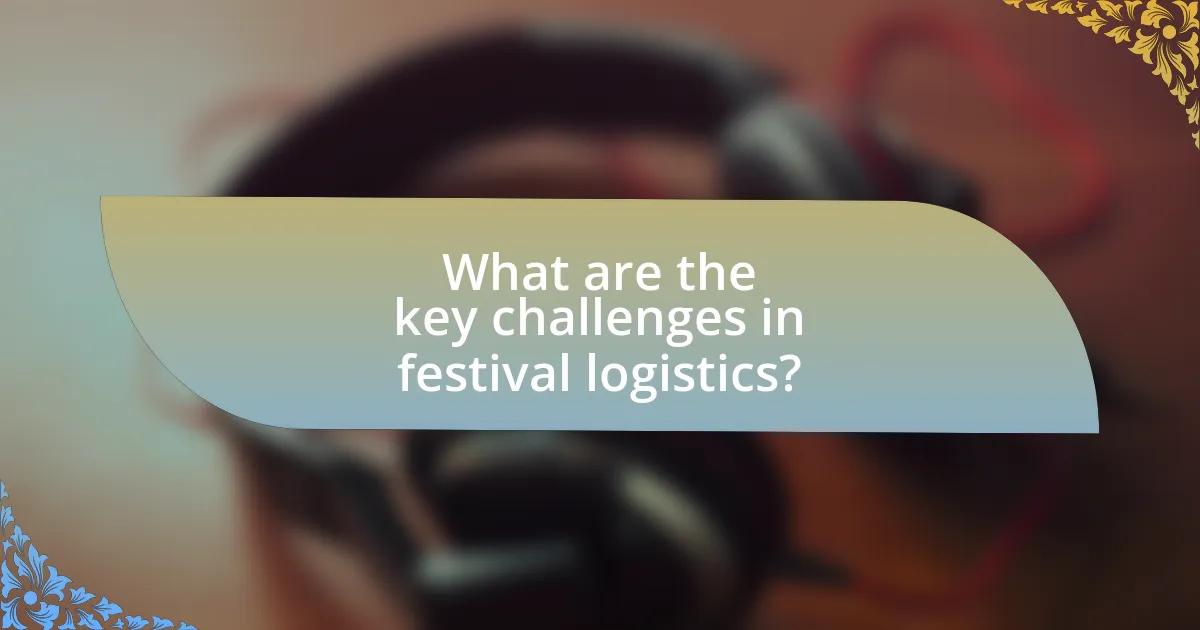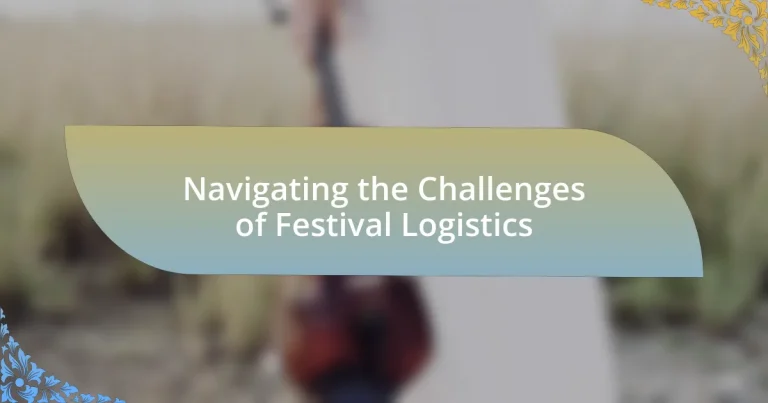The article focuses on the key challenges of festival logistics, emphasizing the importance of effective crowd management, transportation coordination, and resource allocation. It outlines how logistical issues can impact festival planning and attendee experience, highlighting the necessity of strategic communication and resource management. Additionally, the article discusses the role of technology in enhancing logistical efficiency and the emerging trends in sustainability practices within festival logistics. Best practices for contingency planning and vendor management are also examined, providing insights into optimizing operations for successful festival execution.

What are the key challenges in festival logistics?
The key challenges in festival logistics include crowd management, transportation coordination, and resource allocation. Effective crowd management is essential to ensure safety and enhance the attendee experience, as large gatherings can lead to congestion and potential hazards. Transportation coordination is critical for the timely arrival of attendees, staff, and supplies, often complicated by road closures or limited access. Resource allocation involves efficiently distributing equipment, personnel, and services across the festival site, which can be challenging due to fluctuating demand and logistical constraints. These challenges are supported by industry reports indicating that poor logistics can lead to increased costs and negative attendee feedback, highlighting the importance of strategic planning and execution in festival logistics.
How do logistical challenges impact festival planning?
Logistical challenges significantly impact festival planning by affecting the organization, execution, and overall success of the event. These challenges include transportation issues, resource allocation, and coordination among various stakeholders, which can lead to delays, increased costs, and potential safety hazards. For instance, a study by the Event Safety Alliance highlights that inadequate transportation planning can result in traffic congestion, making it difficult for attendees to arrive on time, thereby diminishing their experience. Additionally, logistical failures can lead to insufficient staffing or equipment shortages, which directly affect the quality of services provided at the festival. Therefore, effective logistical management is crucial for ensuring a smooth and successful festival experience.
What are the most common logistical issues faced during festivals?
The most common logistical issues faced during festivals include crowd management, transportation, and resource allocation. Crowd management is critical as festivals often attract large numbers of attendees, leading to potential safety hazards and congestion. Transportation issues arise from the need to efficiently move attendees, staff, and equipment to and from the venue, which can be complicated by traffic and limited parking. Resource allocation involves ensuring that sufficient supplies, such as food, water, and sanitation facilities, are available to meet the demands of attendees, which can be challenging to predict accurately. These logistical challenges can significantly impact the overall success and safety of a festival.
How can these challenges affect attendee experience?
Challenges in festival logistics can significantly diminish attendee experience by causing delays, confusion, and dissatisfaction. For instance, inadequate transportation arrangements may lead to long wait times, resulting in frustration among attendees. Additionally, poor crowd management can create unsafe conditions, making it difficult for attendees to navigate the venue. A study by the Event Safety Alliance highlights that effective logistics planning is crucial for ensuring safety and satisfaction, as 70% of attendees reported that logistical issues negatively impacted their overall experience at events. Thus, logistical challenges directly correlate with attendee perceptions and enjoyment of the festival.
Why is effective communication crucial in festival logistics?
Effective communication is crucial in festival logistics because it ensures coordination among various stakeholders, including vendors, staff, and emergency services. Clear communication facilitates the timely sharing of information, which is essential for managing schedules, resources, and unexpected challenges. For instance, a study by the Event Safety Alliance highlights that miscommunication can lead to safety hazards and operational delays, emphasizing the need for structured communication channels. Additionally, effective communication enhances problem-solving capabilities, allowing teams to respond swiftly to issues that arise during the event, thereby improving overall attendee experience and operational efficiency.
What communication strategies can enhance logistical efficiency?
Effective communication strategies that enhance logistical efficiency include the use of real-time information sharing, centralized communication platforms, and clear role definitions among team members. Real-time information sharing allows for immediate updates on inventory, transportation, and scheduling, which minimizes delays and miscommunication. Centralized communication platforms, such as project management tools or dedicated messaging apps, streamline interactions and ensure that all stakeholders have access to the same information, reducing the risk of errors. Additionally, clearly defined roles and responsibilities help team members understand their tasks and accountability, leading to more coordinated efforts and improved overall efficiency. These strategies have been shown to significantly reduce logistical challenges in various settings, including large-scale events like festivals, where timely and accurate communication is critical for success.
How does technology facilitate communication among festival teams?
Technology facilitates communication among festival teams by providing real-time messaging platforms, project management tools, and collaborative software. These tools enable team members to share updates, coordinate tasks, and resolve issues quickly, which is crucial for the dynamic environment of festival logistics. For instance, platforms like Slack or Microsoft Teams allow instant communication, while tools like Trello or Asana help in tracking project progress and assigning responsibilities. The use of these technologies has been shown to improve efficiency and reduce misunderstandings, as evidenced by a study from the Event Management Journal, which found that effective communication tools can enhance team collaboration by up to 30% during large-scale events.
What role does resource management play in festival logistics?
Resource management is crucial in festival logistics as it ensures the efficient allocation and utilization of assets, personnel, and materials necessary for successful event execution. Effective resource management minimizes waste, optimizes costs, and enhances the overall attendee experience by ensuring that all logistical elements, such as equipment, staffing, and supplies, are available and functioning as intended. For instance, a study by the Event Management Association highlights that festivals with robust resource management strategies can reduce operational costs by up to 20%, demonstrating the tangible benefits of strategic planning in logistics.
How can proper resource allocation prevent logistical failures?
Proper resource allocation can prevent logistical failures by ensuring that all necessary materials, personnel, and equipment are available at the right time and place. When resources are allocated effectively, it minimizes delays and disruptions, which are common causes of logistical failures. For instance, a study by the Project Management Institute found that organizations with high resource management maturity experience 20% fewer project failures. This demonstrates that strategic allocation of resources directly correlates with improved logistical outcomes, thereby enhancing overall operational efficiency in festival logistics.
What types of resources are essential for successful festival logistics?
Successful festival logistics require essential resources such as personnel, equipment, and technology. Personnel includes trained staff for operations, security, and customer service, ensuring smooth execution and safety. Equipment encompasses stages, sound systems, lighting, and sanitation facilities, which are critical for the festival’s infrastructure and attendee experience. Technology involves ticketing systems, communication tools, and logistics software, facilitating efficient management and real-time coordination. These resources collectively contribute to the effective planning and execution of festival logistics, as evidenced by successful events that prioritize these elements to enhance operational efficiency and attendee satisfaction.
How can festival organizers prepare for unexpected challenges?
Festival organizers can prepare for unexpected challenges by developing comprehensive contingency plans that address potential risks. These plans should include risk assessments, emergency response protocols, and communication strategies to ensure quick decision-making during crises. For instance, a study by the Event Safety Alliance highlights that 70% of event organizers who implemented detailed contingency plans reported a smoother response to emergencies. Additionally, conducting regular training sessions for staff and volunteers on emergency procedures can enhance preparedness, as evidenced by the National Association of State Boating Law Administrators, which found that trained personnel significantly reduce response times in emergencies.
What are the best practices for contingency planning in festival logistics?
The best practices for contingency planning in festival logistics include conducting thorough risk assessments, establishing clear communication protocols, and developing flexible resource allocation strategies. Risk assessments identify potential issues such as weather disruptions or vendor failures, allowing organizers to create specific response plans. Clear communication protocols ensure that all stakeholders, including staff, vendors, and emergency services, are informed and can act swiftly in emergencies. Flexible resource allocation strategies enable quick adjustments to staffing, equipment, and supplies based on real-time needs, enhancing the festival’s resilience. These practices are supported by industry standards, such as the Event Safety Alliance’s guidelines, which emphasize proactive planning and adaptability in event management.

What specific logistical elements must be considered for festivals?
Key logistical elements for festivals include venue selection, crowd management, transportation, security, vendor coordination, waste management, and emergency planning. Venue selection involves assessing capacity, accessibility, and facilities to accommodate attendees and activities. Crowd management requires strategies for controlling flow and ensuring safety, particularly during peak times. Transportation logistics encompass planning for parking, public transit access, and shuttle services to facilitate attendee movement. Security measures must be established to protect attendees and assets, including hiring personnel and implementing screening processes. Vendor coordination involves managing food, merchandise, and service providers to ensure quality and compliance with regulations. Waste management strategies are essential for maintaining cleanliness and sustainability, often involving recycling and disposal plans. Lastly, emergency planning must address potential risks, including medical emergencies and severe weather, ensuring that protocols are in place for swift response.
How do transportation and parking logistics affect festival operations?
Transportation and parking logistics significantly impact festival operations by influencing attendee access, safety, and overall experience. Efficient transportation systems ensure that attendees can arrive at the festival site without delays, which is crucial for maintaining the event schedule and maximizing participation. For instance, festivals that provide clear signage, shuttle services, and designated drop-off zones can reduce congestion and improve flow, leading to a more enjoyable experience for attendees.
Moreover, effective parking logistics, such as the allocation of sufficient parking spaces and the management of traffic flow, directly affect the safety and convenience of festival-goers. According to a study by the Event Safety Alliance, poorly managed parking can lead to increased wait times and frustration, which may deter attendees from returning in future years. Thus, the integration of well-planned transportation and parking logistics is essential for successful festival operations, ensuring that logistical challenges do not detract from the overall event experience.
What are the best strategies for managing transportation logistics?
The best strategies for managing transportation logistics include optimizing route planning, utilizing technology for real-time tracking, and establishing strong communication channels. Optimizing route planning reduces fuel costs and delivery times, which is crucial for events like festivals where timing is essential. Utilizing technology, such as GPS and transportation management systems, allows for real-time tracking of shipments, enhancing visibility and enabling quick adjustments to unforeseen circumstances. Establishing strong communication channels among all stakeholders, including suppliers, transporters, and event organizers, ensures that everyone is informed and can respond promptly to any issues that arise. These strategies collectively enhance efficiency and reliability in transportation logistics, which is vital for the success of festival logistics.
How can parking logistics be optimized for large crowds?
Parking logistics can be optimized for large crowds by implementing a combination of advanced technology, strategic planning, and effective communication. Utilizing real-time data analytics and mobile applications can streamline the parking process, allowing attendees to find available spaces quickly and efficiently. For instance, systems that provide live updates on parking availability can reduce congestion and wait times, enhancing the overall experience.
Additionally, pre-event planning that includes designated parking zones, shuttle services, and clear signage can facilitate smoother traffic flow. Research indicates that events with organized parking strategies can improve attendee satisfaction by up to 30%, as reported in a study by the International Festival and Events Association. This evidence underscores the importance of proactive measures in managing parking logistics effectively during large gatherings.
What are the key considerations for vendor management in festivals?
Key considerations for vendor management in festivals include clear communication, contract negotiation, compliance with regulations, and performance evaluation. Clear communication ensures that all parties understand expectations, timelines, and responsibilities, which is crucial for smooth operations. Contract negotiation should cover terms such as payment schedules, service levels, and cancellation policies to protect both the festival organizers and vendors. Compliance with local regulations, including health and safety standards, is essential to avoid legal issues and ensure a safe environment for attendees. Performance evaluation involves assessing vendor reliability and quality of service, which can inform future vendor selections and improve overall festival logistics.
How can organizers ensure a smooth vendor setup and operation?
Organizers can ensure a smooth vendor setup and operation by implementing a detailed logistical plan that includes clear communication, designated setup times, and adequate resources. Establishing a comprehensive vendor manual that outlines expectations, rules, and procedures helps vendors understand their responsibilities and reduces confusion. Additionally, providing a designated area for vendor setup, along with necessary utilities such as electricity and water, facilitates efficient operations. Historical data from successful festivals indicates that organized vendor management leads to increased vendor satisfaction and operational efficiency, ultimately enhancing the overall festival experience.
What criteria should be used to select vendors for festivals?
To select vendors for festivals, criteria should include experience, product quality, reliability, and cost-effectiveness. Experience ensures that vendors are familiar with festival logistics, which can enhance operational efficiency. Product quality is crucial as it directly impacts attendee satisfaction and the overall reputation of the festival. Reliability is essential to ensure that vendors can meet deadlines and deliver services as promised, minimizing disruptions. Cost-effectiveness allows festival organizers to maximize their budget while still providing quality offerings. These criteria are validated by industry standards, which emphasize the importance of vendor performance in successful event management.
How does crowd management contribute to successful festival logistics?
Crowd management is essential for successful festival logistics as it ensures the safety, efficiency, and overall experience of attendees. Effective crowd management strategies, such as designated entry and exit points, help control the flow of people, reducing congestion and minimizing the risk of accidents. For instance, studies have shown that well-planned crowd control measures can decrease emergency response times by up to 30%, thereby enhancing safety. Additionally, proper crowd management facilitates better resource allocation, allowing organizers to deploy staff and services where they are most needed, ultimately leading to a smoother operation and higher attendee satisfaction.
What techniques can be employed for effective crowd control?
Effective crowd control techniques include the use of barriers, crowd management staff, and technology such as surveillance systems. Barriers, such as fences or ropes, help direct the flow of people and prevent overcrowding in specific areas. Trained crowd management staff can monitor crowd behavior, provide assistance, and enforce safety protocols, which is crucial during large events. Additionally, technology like surveillance cameras and crowd monitoring software can provide real-time data on crowd density and movement, allowing for timely interventions. These methods have been proven effective in various large-scale events, such as music festivals and sporting events, where managing large groups is essential for safety and order.
How can technology assist in crowd management during festivals?
Technology can assist in crowd management during festivals by utilizing real-time data analytics, mobile applications, and surveillance systems. Real-time data analytics allows event organizers to monitor crowd density and movement patterns, enabling them to make informed decisions about resource allocation and crowd control measures. Mobile applications can provide attendees with information on crowd levels, wait times, and alternative routes, enhancing their experience while reducing congestion. Additionally, surveillance systems equipped with artificial intelligence can identify potential safety hazards and alert security personnel, ensuring a safer environment. For instance, a study by the International Journal of Event Management Research highlights that festivals employing these technologies reported a 30% improvement in crowd flow and safety management.

What are the emerging trends in festival logistics?
Emerging trends in festival logistics include the increased use of technology for real-time tracking and management, sustainability initiatives, and enhanced crowd management strategies. Technology such as RFID wristbands and mobile apps allows for efficient attendee tracking and resource allocation, improving overall operational efficiency. Sustainability initiatives are gaining traction, with festivals adopting eco-friendly practices like waste reduction and renewable energy sources, reflecting a growing consumer demand for environmentally responsible events. Additionally, enhanced crowd management strategies, including the use of data analytics to predict attendance patterns, are being implemented to ensure safety and improve the attendee experience. These trends are reshaping how festivals are organized and executed, making them more efficient and responsive to attendee needs.
How is technology transforming festival logistics?
Technology is transforming festival logistics by enhancing efficiency, improving communication, and streamlining operations. For instance, the use of mobile apps allows organizers to manage schedules, ticketing, and attendee engagement in real-time, significantly reducing wait times and improving the overall experience. Additionally, data analytics enables festival planners to forecast attendance and optimize resource allocation, leading to cost savings and better crowd management. According to a report by Eventbrite, 70% of event organizers believe that technology has improved their ability to manage logistics effectively. This integration of technology not only facilitates smoother operations but also enhances safety measures through real-time monitoring and communication systems.
What innovative tools are being used to streamline logistics?
Innovative tools used to streamline logistics include advanced software platforms, automated inventory management systems, and real-time tracking technologies. These tools enhance efficiency by optimizing supply chain processes, reducing manual errors, and providing visibility into inventory levels. For instance, companies like SAP and Oracle offer integrated logistics management solutions that facilitate better planning and execution. Additionally, the use of Internet of Things (IoT) devices allows for real-time monitoring of shipments, which can lead to improved decision-making and reduced delays. According to a report by McKinsey, companies that adopt such technologies can see a 20-30% improvement in logistics efficiency.
How can data analytics improve logistical decision-making?
Data analytics can significantly enhance logistical decision-making by providing actionable insights derived from data patterns and trends. By analyzing historical data, logistics managers can forecast demand, optimize inventory levels, and streamline supply chain operations. For instance, a study by McKinsey & Company found that companies using advanced analytics in logistics can reduce costs by 15% to 20% and improve service levels by 10% to 15%. This data-driven approach allows for more informed decisions, leading to increased efficiency and reduced operational risks in festival logistics.
What sustainability practices are being adopted in festival logistics?
Sustainability practices in festival logistics include waste reduction, energy efficiency, and sustainable transportation. Festivals are increasingly implementing waste management strategies such as recycling and composting to minimize landfill contributions, with some events achieving over 70% waste diversion rates. Energy-efficient solutions, such as solar-powered stages and LED lighting, are being adopted to reduce carbon footprints. Additionally, organizers are promoting sustainable transportation options, including public transit partnerships and bike-sharing programs, to decrease vehicle emissions. These practices are supported by industry standards and guidelines, such as the A Greener Festival initiative, which provides frameworks for reducing environmental impacts at events.
How can festivals reduce their environmental impact through logistics?
Festivals can reduce their environmental impact through logistics by implementing sustainable transportation options, optimizing waste management, and utilizing eco-friendly materials. Sustainable transportation, such as encouraging public transit, carpooling, and providing shuttle services, minimizes carbon emissions associated with attendee travel. For instance, the Glastonbury Festival has successfully reduced its carbon footprint by promoting bus and train travel, resulting in a significant decrease in vehicle emissions.
Optimizing waste management involves establishing comprehensive recycling and composting programs, which can divert up to 70% of waste from landfills, as demonstrated by the Coachella Valley Music and Arts Festival. Additionally, using biodegradable or reusable materials for food and beverage service reduces single-use plastics, further decreasing environmental harm. By integrating these logistics strategies, festivals can effectively lower their ecological footprint while enhancing sustainability.
What role do local communities play in sustainable festival logistics?
Local communities play a crucial role in sustainable festival logistics by providing essential support in resource management, waste reduction, and cultural integration. Their involvement ensures that festivals align with local sustainability goals, as communities often contribute local knowledge and practices that enhance environmental stewardship. For instance, community members can facilitate recycling and composting initiatives, reducing the overall waste generated during events. Additionally, local businesses can supply goods and services, minimizing transportation emissions and supporting the local economy. Studies have shown that festivals that actively engage local communities in planning and execution tend to have a lower environmental impact and foster a sense of ownership and pride among residents, leading to more successful and sustainable events.
What are the top tips for successful festival logistics management?
Successful festival logistics management requires meticulous planning, effective communication, and adaptability. First, establish a comprehensive logistics plan that outlines all operational aspects, including transportation, vendor coordination, and resource allocation. This plan should be based on historical data from previous festivals, which can provide insights into crowd sizes, peak times, and logistical challenges faced.
Next, ensure clear communication among all stakeholders, including vendors, staff, and volunteers. Utilizing project management tools can facilitate real-time updates and coordination, reducing the likelihood of miscommunication.
Additionally, conduct thorough site assessments to identify potential challenges such as access routes, emergency exits, and utility placements. This proactive approach allows for the anticipation of issues before they arise.
Finally, implement a flexible contingency plan to address unforeseen circumstances, such as weather changes or supply chain disruptions. This adaptability is crucial, as it enables quick responses to maintain festival operations smoothly.
These strategies are supported by industry best practices, which emphasize the importance of preparation and collaboration in successful event logistics management.





